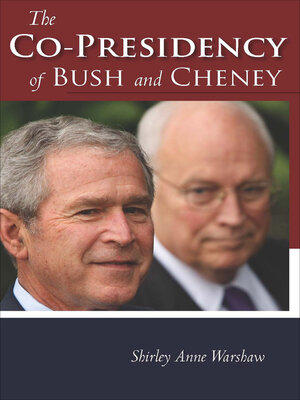
Sign up to save your library
With an OverDrive account, you can save your favorite libraries for at-a-glance information about availability. Find out more about OverDrive accounts.
Find this title in Libby, the library reading app by OverDrive.



Search for a digital library with this title
Title found at these libraries:
| Library Name | Distance |
|---|---|
| Loading... |
This analysis of the Bush administration reveals how the president willingly ceded power to a calculating vice president—with disastrous consequences.
Under the relatively inexperienced president George W. Bush, Dick Cheney was perhaps the most powerful vice president in American history. In this excellently documented work, presidential scholar Shirley Anne Warshaw debunks the popular myth that Bush's authority was hijacked or stolen. Instead, drawing on extensive research as well as personal interviews with White House Staffers and Washington insiders, she demonstrates how Bush and Cheney operated as nothing less than co-presidents.
While Bush focused on building what he called a moral and civil society, anchored by a war on science and by the proliferation of faith-based programs, he allowed Cheney to lead in business and foreign policy. Warshaw highlights Cheney's decades-long career in Washington and his familiarity with its inner workings to present a complete picture of this calculating political powerhouse. From Cheney's unprecedented merging of presidential and vice-presidential authority to his abhorrence of what he deemed congressional interference, Warshaw paints an intriguing, and at times frightening, portrait.
Under the relatively inexperienced president George W. Bush, Dick Cheney was perhaps the most powerful vice president in American history. In this excellently documented work, presidential scholar Shirley Anne Warshaw debunks the popular myth that Bush's authority was hijacked or stolen. Instead, drawing on extensive research as well as personal interviews with White House Staffers and Washington insiders, she demonstrates how Bush and Cheney operated as nothing less than co-presidents.
While Bush focused on building what he called a moral and civil society, anchored by a war on science and by the proliferation of faith-based programs, he allowed Cheney to lead in business and foreign policy. Warshaw highlights Cheney's decades-long career in Washington and his familiarity with its inner workings to present a complete picture of this calculating political powerhouse. From Cheney's unprecedented merging of presidential and vice-presidential authority to his abhorrence of what he deemed congressional interference, Warshaw paints an intriguing, and at times frightening, portrait.







